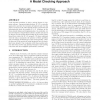Free Online Productivity Tools
i2Speak
i2Symbol
i2OCR
iTex2Img
iWeb2Print
iWeb2Shot
i2Type
iPdf2Split
iPdf2Merge
i2Bopomofo
i2Arabic
i2Style
i2Image
i2PDF
iLatex2Rtf
Sci2ools
133
Voted
ACSAC
2010
IEEE
2010
IEEE
Analyzing and improving Linux kernel memory protection: a model checking approach
Code injection continues to pose a serious threat to computer systems. Among existing solutions, W X is a notable approach to prevent the execution of injected code. In this paper, we focus on the Linux kernel memory protection and systematically check for possible W X violations in the Linux kernel design and implementation. In particular, we eloped a Murphi-based abstract model and used it to discover several serious shortcomings in the current Linux kernel that violate the W X property. We have confirmed with the Linux community the presence of these problems and accordingly developed five Linux kernel patches. (Four of them are in the process of being integrated into the mainline Linux kernel.) Our evaluation with these patches indicate that they involve only minimal changes to the existing code base and incur negligible performance overhead.
Related Content
| Added | 10 Feb 2011 |
| Updated | 10 Feb 2011 |
| Type | Journal |
| Year | 2010 |
| Where | ACSAC |
| Authors | Siarhei Liakh, Michael C. Grace, Xuxian Jiang |
Comments (0)

